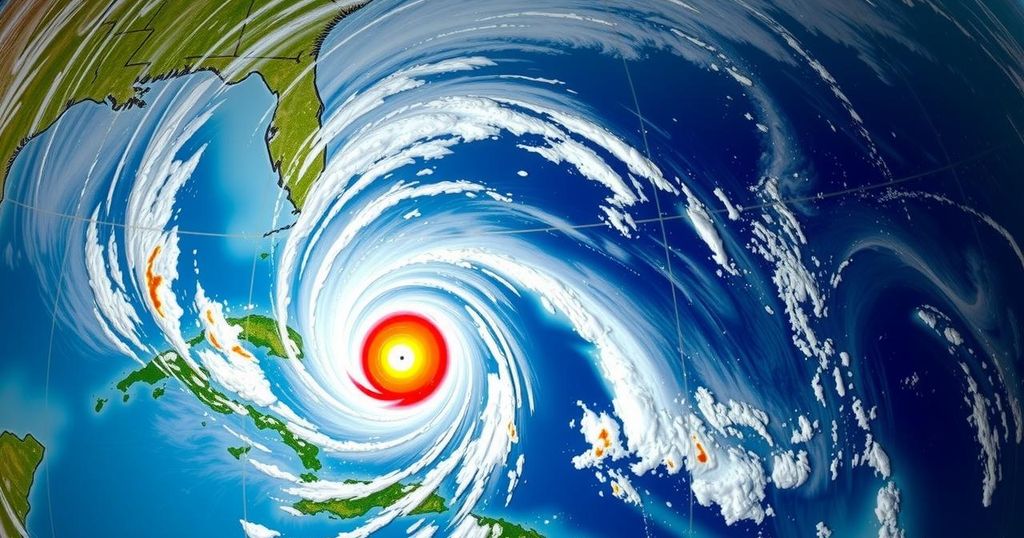The 2024 Atlantic hurricane season ended with eleven hurricanes, well above the average of seven, resulting in significant destruction and fatalities, particularly from Hurricanes Helene and Milton. Meteorologists noted unusually warm ocean temperatures as a factor for the season’s intensity, marked by early and late-season hurricanes with record wind speeds and damages exceeding billions across multiple states.
The 2024 Atlantic hurricane season concluded with a total of eleven hurricanes, significantly above the average of seven, resulting in considerable casualties and devastation across various regions, including the U.S. Gulf Coast. Meteorologists characterized this season as exceptionally active, largely attributed to unusually elevated ocean temperatures. Notably, eight hurricanes made landfall across multiple regions, including the United States, Bermuda, Cuba, the Dominican Republic, and Grenada.
Hurricane Beryl distinguished itself as the first recorded Category 4 hurricane to form in June, making landfall in Grenada’s Carriacou island and subsequently causing destruction in Jamaica, including crop loss and fatalities. This phenomenon marked a rarity, as the previous Category 4 hurricane to affect Jamaica was Hurricane Dean in 2007. Additionally, Beryl intensified into the earliest Category 5 hurricane on record in the Atlantic, with major hurricanes typically emerging post-September 1, according to the National Hurricane Center.
September witnessed Hurricane Helene wreaking havoc across the southeastern United States, registering as the deadliest storm to strike the U.S. mainland since Hurricane Katrina in 2005, leading to over 200 fatalities. North Carolina reported damages exceeding $48.8 billion, affecting vital infrastructures like homes and public utilities. Other states, including Florida, Georgia, South Carolina, Tennessee, and Virginia, also experienced significant destruction.
In October, Hurricane Milton demonstrated rapid intensification, its maximum wind speeds reaching an astonishing 180 mph, categorizing it as one of the most intense hurricanes ever recorded in the Gulf of Mexico, second only to Hurricane Rita in 2005. The impacts of Hurricanes Helene and Milton were profound, with locations experiencing rainfall three times their average for September and October, marking the period as the wettest on record for cities such as Asheville, Tampa, and Orlando.
By November, Hurricane Rafael made its presence known, achieving wind speeds of up to 120 mph, nearly reaching record strength for a November hurricane in the Gulf of Mexico. Rafael made landfall in Cuba, compounding recovery efforts from Hurricane Oscar’s prior impact on the island. The contributing factors to the formation of these hurricanes include the unusually warm ocean temperatures, promoting unexpected hurricane activity at atypical times and locations. As stated by Brian McNoldy, a hurricane researcher at the University of Miami, “In other words, we never had a storm as strong as Beryl so early in the season anywhere in the Atlantic and we never had a storm as strong as Milton so late in the season in the Gulf of Mexico.”
Hurricane seasons are characterized by periods of increased cyclone activity, typically occurring from June through November in the Atlantic region. The occurrence and intensity of hurricanes can be influenced by climatic factors, including sea surface temperatures. Warm ocean waters enhance hurricane formation and intensification capabilities. Anomalously high temperatures in oceanic regions have prompted more intense storms to form at unexpected times of the year, challenging previous climatological norms. The severity of the 2024 Atlantic hurricane season reflects these changes and emphasizes the fragility of the ecosystems and human infrastructures in affected areas.
The 2024 Atlantic hurricane season proved to be notably tumultuous with significant historical milestones, including multiple hurricanes forming unexpectedly and causing widespread devastation. The season underscored the continuous threat posed by potent hurricanes as they increasingly manifest due to climatic shifts. The impacts of such storms highlight the urgent need for enhanced preparedness and adaptation strategies in vulnerable regions to mitigate future risks and damages, as emphasized by the ongoing scientific discussions surrounding climate change’s influence on extreme weather events.
Original Source: nsjonline.com







